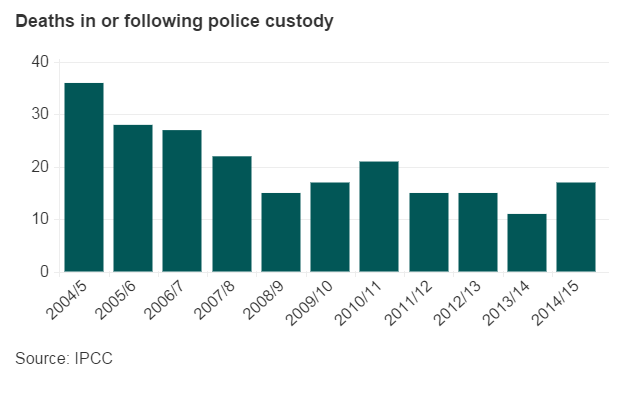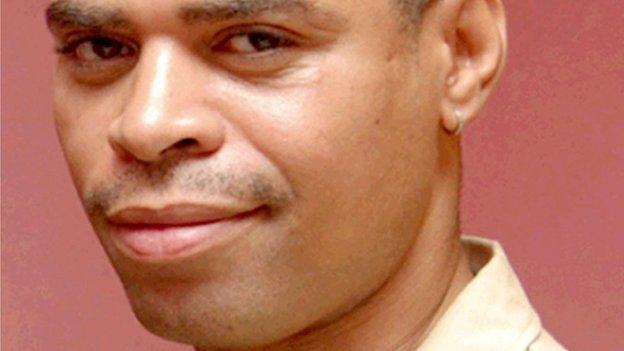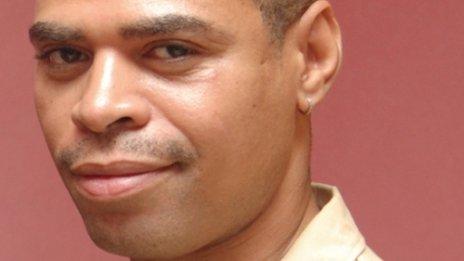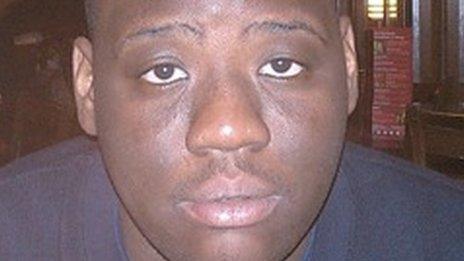Custody deaths represent failure - Theresa May
- Published
Marcia Rigg-Samuel, whose brother died in custody, wants more police accountability
Each death in police custody represents a failure and can "dramatically" undermine relations between the public and police, says the home secretary.
Theresa May announced an independent review into deaths in or following custody in England and Wales.
Marcia Rigg-Samuel, whose brother Sean Rigg died in 2008, said she and other families wanted "real change".
Meanwhile, official figures show there were 17 such deaths in 2014-15 - the highest number for five years.
The review will examine "procedures and processes" involving custody deaths and serious non-fatal incidents.
It comes after high-profile cases and allegations of wrongdoing.
'Vulnerable people'
In a speech in south London, Mrs May said: "Police custody is a place where a number of dynamics meet.
"It is a place where dangerous and difficult criminals are rightly locked up. Where officers and staff regularly face violent, threatening and abusive behaviour, and where the police use some of their most sensitive and coercive powers.
"But it is also a place where all too often vulnerable people, often with mental health problems, are taken because there is no other place to go.
"Vulnerable people like Sean Rigg who died not far from here in Brixton police station."
The home secretary said the families of Mr Rigg and another man from London - Olaseni Lewis, who was mentally ill and died after being restrained by police in 2010 - had been sharing their experiences with her over the past few months.
Mrs May said she had been struck by the "pain and suffering" of families who faced what seemed to be evasiveness and obstruction of the facts.
She pledged the review would have the experiences of families at its heart, and its chairman - yet to be appointed - would be someone prepared to ask "difficult questions".

![[From left] Olaseni Lewis, Jacob Michael, Roger Sylvester](https://ichef.bbci.co.uk/ace/standard/624/cpsprodpb/39DE/production/_84441841_deaths2.jpg)


In 2013, a review found the Independent Police Complaints Commission (IPCC) had committed a series of blunders in its investigation of the death of Mr Rigg.
The original investigation had concluded that officers had acted reasonably and proportionately - a finding rejected by a jury at Mr Rigg's subsequent inquest.
Ms Rigg-Samuel told the BBC: "What I want, and I speak for myself and on behalf of other families, is that this review is effective and brings real change on the issue of deaths in custody, and how families feel and how we are treated, and that there's proper accountability."
In 2010, allegations that the IPCC had failed to properly investigate the death of Mr Lewis led to the High Court quashing the watchdog's original findings in the case.
Restraint techniques
The plan to review how deaths in custody occur - and how they are investigated - comes after the IPCC was criticised for inadequately getting to the bottom of a number of fatalities.
The review will cover the lead-up to deaths, the immediate aftermath and how families are helped or supported during official investigations.
It will assess whether police officers properly understand mental health issues, the availability of appropriate healthcare, the use of restraint techniques, and the risk of suicides in the first 48 hours of detention.

What happened to Sean Rigg?

Sean Rigg, who had suffered from schizophrenia for 20 years, was arrested in August 2008 and taken to Brixton police station in south London.
He had been arrested on suspicion of committing public order offences and attacking a police officer in neighbouring Balham. Hours later, the "boisterous, talented" 40-year-old musician was taken by ambulance to hospital, where he was declared dead.
According to his sister, Marcia Rigg-Samuel, police told the family he had "suddenly collapsed and died", but nothing more.
Mr Rigg, who had begun his own record label and released a CD, was seen by a doctor after he became ill at the police station and given CPR when his condition worsened.
He had a history of discontinuing his medication, which led to him being arrested several times and sectioned under the Mental Health Act.
Mr Rigg once travelled abroad frequently and had been in trouble with the police in Thailand, Switzerland and Paris, but every time he was released and sent back to the UK because of his illness, his sister said.

The Independent Police Complaints Commission's annual report on deaths, external during or following police contact said:
The figure of 17 is an increase from 11 last year, which was the lowest number since recording began in 2004-05
The figure was at its highest at 36 in 2004-05
Eight of those who died in 2014-15, and half of those apparently taking their own life after custody, had mental health concerns
All but one of those who died, and more than a third of those who apparently took their own life, had links to drugs or alcohol
IPCC chairwoman Dame Anne Owers said the custody system suffered from "inadequate risk assessments, token checks on a person in custody, insufficient handovers between custody staff, a failure to recognise or properly deal with people with mental health concerns or substance abuse issues, poor liaison between police and other agencies".
Deborah Coles, of the charity Inquest, which provides advice to people bereaved by a death in custody, said it was "too early to tell" if the review was more of a public relations exercise or a real attempt to bring about effective systemic change.
- Published17 May 2013

- Published19 July 2013
